There's a lot that goes into building a strong personal brand. And one of the most important elements of a personal brand is a brand statement. Just like brands and businesses have a statement that says something about them and their values, you need a strong statement of who you are and what you can do.
It doesn't have to be a lengthy account of your entire life and career. In fact, a personal brand statement is often most effective when it's concise and to the point. Ann Handley's personal brand statement, for example, is just four words:
"Empowering ridiculously good marketing."
It says all you need to know about her as a marketer and thought leader.
So, what makes a great personal brand statement? How do you even go about writing one? We share some of our favorite personal brand statement examples to inspire you.
9 Personal Brand Statement Examples To Help You Craft Your Own Brand:
- What Is a Personal Brand Statement?
- 9 Personal Brand Statement Examples for Inspiration
- Why Is a Personal Brand Statement Important?
- What Are the Elements of a Strong Personal Brand Statement?
- How to Craft Your Own Personal Brand Statement?
- Best Practices for Writing a Personal Brand Statement
- Time to Build Yourself a Brand
- Frequently Asked Questions
What Is a Personal Brand Statement?
Your personal brand statement is basically a catchphrase that says something about your expertise and what makes you unique. It gives people a quick glance into what you can do so they'll be able to understand how you can be of benefit to them. And if it's catchy enough, that's how people are going to recognize and remember you.
Think of it as your elevator pitch or your personal tagline. It should be memorable, concise, and impactful. It's usually just a sentence or a few words, but it can say a lot about who you are and what you offer.
Let's say you're a designer. Your personal brand statement could be "Designing wardrobe favorites." It's short but tells the reader that you specialize in fashion design and have a knack for creating pieces that people love.
Similarly, if you're a marketer, your personal brand statement could be "I tell stories that sell." Again, it's quite short and sweet, but it gives a clear indication of your skills in storytelling and driving sales. We cover this in more detail in our personal branding 101 guide.
Next up, who might want to see your personal brand statement? It's usually recruiters and potential employees. However, clients also tend to judge your expertise based on the personal branding statement on your website or social media profiles. And let's not forget networking events and conferences, where your personal brand statement can set you apart from others.
9 Personal Brand Statement Examples for Inspiration
We have included personal brand statements of people from different walks of life to make this guide more comprehensive. These statements are meant to give you an idea of what your own personal brand statement could look like.
1. Madalyn Sklar
I’ve been hard at work on a new project that is quite a departure from my usual social media marketing content. It’s about something much more personal, #ChronicPain. Take a listen to my story. Maybe the info will help you or a loved one. https://t.co/6O0NoikvCB
— Madalyn Sklar (@MadalynSklar) December 1, 2023
Personal Brand Statement:
Host of the @KratomStory podcast 🍃 Previously known as the tattoo-wearing social media evangelist, Twitter Guru & Fearless leader of @GoGirlsMusic
Madalyn Sklar is a social media influencer and serial entrepreneur with 30 years of experience in social media strategy, community leadership, and digital marketing. She started her journey in 1996 with the launch of Cybersites Web Design, which was among the first-ever web design companies in Houston. She's also the founder of GoGirlsMusic, an online community that empowers and supports women in the music industry.
One of her most recent contributions to the digital world is the #TwitterSmarter brand with a podcast and X threads. The hashtag has become an international trend in which users share tips and strategies for success on X.
Why It Works
Madalyn's personal brand statement, right off the bat, tells you exactly what she is passionate about and who she wants to help. It's straightforward, energetic, and action-oriented. The use of powerful phrases like "rockstar results" and "just do it" captures the attention and motivates her audience to take action.
Her statement also mentions her motto, which is a key element in personal branding. It reflects her values and beliefs, which she not only lives by but also teaches to others. More importantly, she shows her specialization: Twitter. Yes, she's a social media guru, but she has a specific focus, which helps her stand out from the crowd.
2. Neil Patel
I'll never have millions of followers on social media.
Sure, I have over a million followers on YouTube and over a million on Facebook, but I'll never have anything like a Tony Robbins, Gary Vee, or even a Kardashian.
Why?
Because my content isn't applicable to a wide…
— Neil Patel (@neilpatel) July 21, 2024
Personal Brand Statement:
Founder of @NPDigital. New York Times bestselling author, Forbes top 10 marketer, and creator of 1 of the 100 most brilliant companies by Entrepreneur Magazine.
Neil Patel is a well-known digital marketing expert, blogger, entrepreneur, and bestselling author. He started his career at the young age of 16, and since then, he has founded multiple successful companies such as Kissmetrics, CrazyEgg, UberSuggest, and NP Digital.
Why It Works
Neil's personal brand statement highlights his impressive achievements and credentials, backed by reputable sources like the New York Times and Forbes, immediately positioning him as an authority in his field and building trust with his audience. Plus, the statement shows his many roles, including entrepreneur, marketer, and author.
He follows a "show, not tell" approach by mentioning his marketing agency, NP Digital, and other achievements. Since the organizations that have recognized him as a top marketer are well-known and respected, his brand instantly gains credibility.
3. Noah Kagan
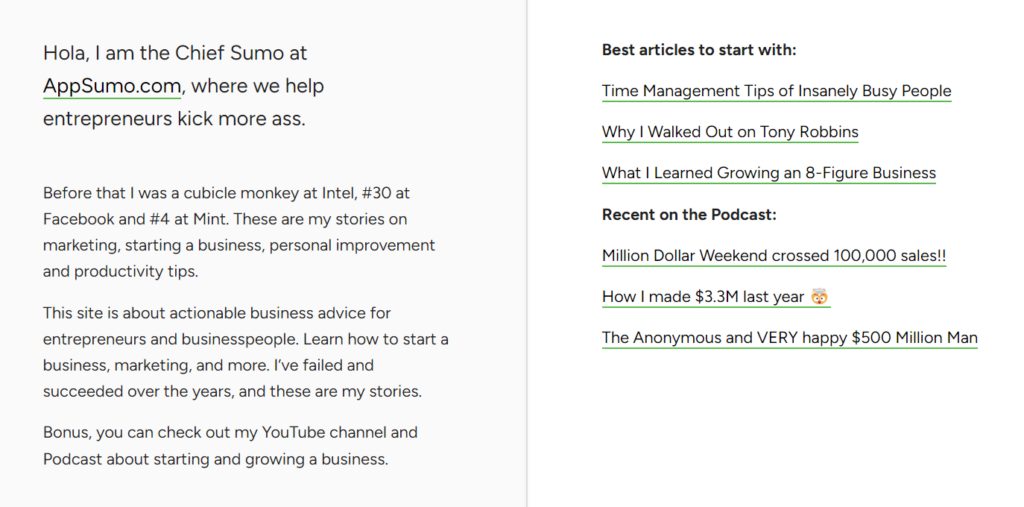
Noah Kagan personal website
Personal Brand Statement:
Hola, I am the Chief Sumo at AppSumo.com, where we help entrepreneurs kick more ass. Before that, I was a cubicle monkey at Intel, #30 at Facebook and #4 at Mint. These are my stories on marketing, starting a business, personal improvement and productivity tips.
Known for launching AppSumo.com, a platform where businesses can find deals on software products, Noah Kagan is a prominent figure in the world of entrepreneurship and marketing. He is also a successful YouTuber, sharing business tips and insights on his channel. His personal brand statement comes from the About section of his website.
Why It Works
Noah introduces himself with a casual and friendly greeting, using the word "Hola" to create a sense of warmth and approachability. He states his current role as the Chief Sumo at AppSumo.com, again using a playful and unique title to show his creativity.
Next, he mentions his previous experience at well-known companies like Intel, Facebook and Mint, highlighting his impressive career journey. These mentions serve as the past experience section on a resume; they tell the reader that the person knows what he's talking about. Towards the end, he establishes himself as an expert in the fields of marketing, starting a business, personal improvement, and productivity.
Noah's personal statement works because it's not merely a list of his credentials. It also exudes his personal tone. Phrases like "Chief Sumo" and "kick more ass" are typically unusual in a professional setting. However, Noah uses them to show a more human and relatable side to his personal brand.
4. Melyssa Griffin
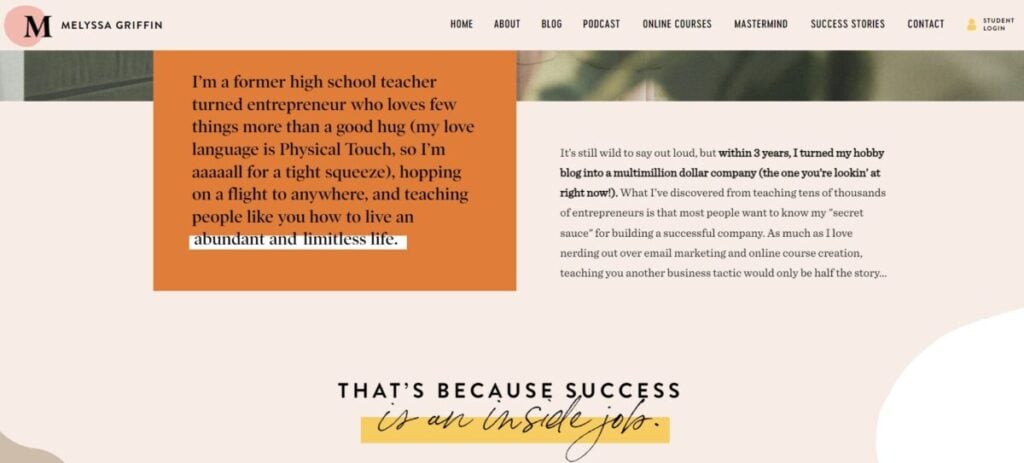
Melyssa Griffin personal website
Personal Brand Statement:
I'm a former high school teacher turned entrepreneur who loves few things more than a good hug (my love language is Physical Touch, so I'm aaaaall for a tight squeeze), hopping on a flight to anywhere, and teaching people like you how to live an abundant and limitless life.
Melyssa Griffin is a teacher-turned-entrepreneur who expanded her blog into a multimillion-dollar business in just three years. She shares her "secret sauce" for building a company in her online courses and mentorship programs. Her personal statement, even though not heavily focused on achievements, gets the right message across.
Why It Works
Melyssa's personal statement highlights her unique journey from a high school teacher to a successful entrepreneur, which in itself is an ode to her growth mindset. If she's done this for herself, she must know how to help others achieve the same growth, wouldn't she?
Like Noah, her statement also includes a human touch, as she mentions her love for a good hug. What makes her statement work is that she doesn't just list her achievements, but instead, she shares her passion for teaching and helping others. It makes the reader feel that she truly cares about them and is not solely focused on making money or gaining recognition.
5. Sean Cannell
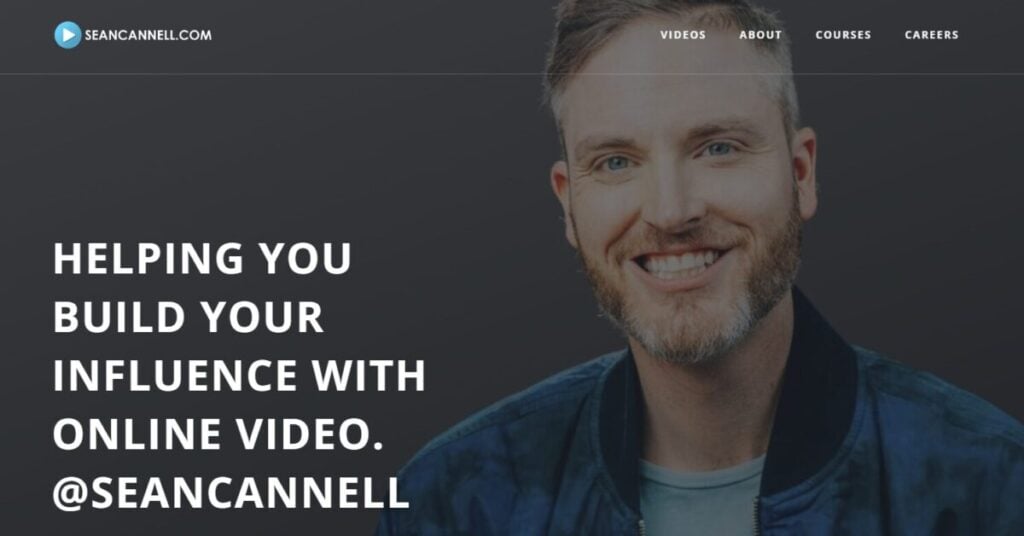
Sean Cannell personal website
Personal Brand Statement:
Helping you build your influence with online video.
Sean Cannell is a YouTuber and entrepreneur who teaches his followers how to create a YouTube strategy for their businesses. He makes YouTube videos and creates online courses to teach his audience how to use video marketing to grow their influence and business.
Why It Works
Sean's personal brand statement directly addresses his target audience: individuals or businesses who want to build their influence with online video. He doesn't use "people" or "audience" but specifically says "you." That's a powerful word that makes the reader feel like he's speaking directly to them, which immediately creates a connection.
Despite being short, the statement clearly communicates what Sean does. It also carves a speciality for him—video—in the broader field of digital marketing. The specificity of his statement hits the mark.
6. Jennifer Welsh
Personal Brand Statement:
Empowering successful women to take control of their finances.
Jennifer Welsh is a financial coach and entrepreneur who teaches women how to invest in the stock market. Previously working as the Director of Employee Experience at Thrive Internet Marketing Agency, she has since founded several communities, including Money School and Audience & Income.
Why It Works
Jennifer's personal brand statement works because it's targeted towards a specific demographic: successful women. She doesn't specifically state that she teaches stock market investing but rather uses the word "empowering," which is indicative of a more holistic approach to finances. That helps her attract women who would be interested in Money School, her week-by-week strategy for debt repayment, budgeting, mindful spending, and stock market investing.
7. Nomadic Matt
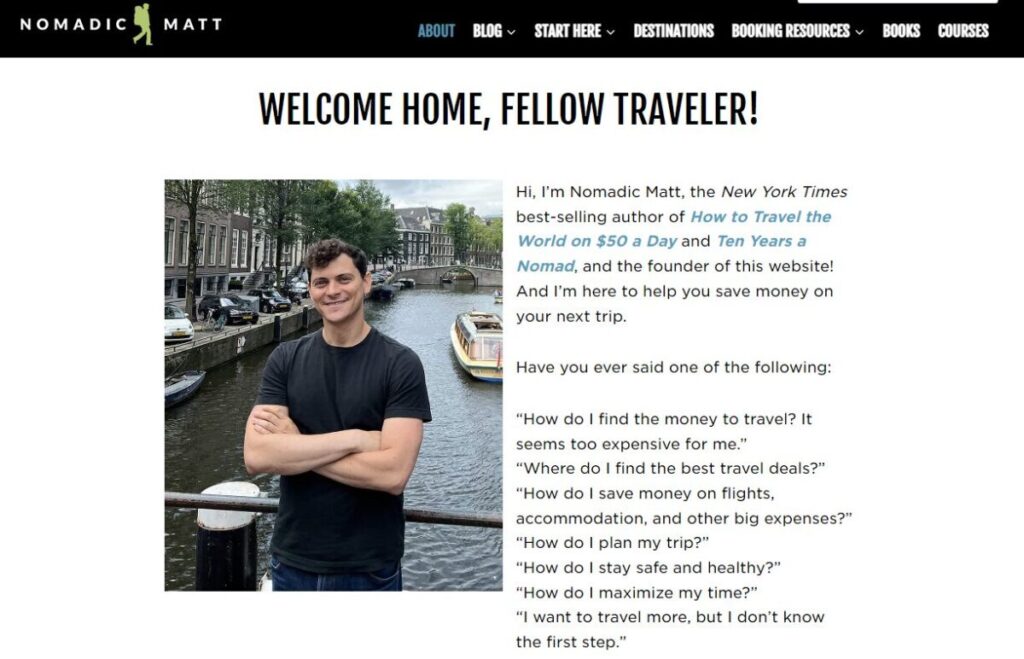
Nomadic Matt personal website
Personal Brand Statement:
I'm Nomadic Matt, the New York Times best-selling author of How to Travel the World on $50 a Day and Ten Years a Nomad, and the founder of this website! And I'm here to help you save money on your next trip.
Nomadic Matt is a blogger and travel expert who has been traveling the world for over a decade. He has a successful travel blog where he shares his time-tested tips for travelers. Besides being the author of two best-selling books, he also offers guides to help people travel on a budget.
Why It Works
Matt's personal statement has quite a conversational tone to it, which works well in his industry. He starts by introducing himself and his accomplishments, immediately establishing credibility. He then uses inclusive language, saying, "I'm here to help YOU," which makes the reader feel personally addressed and creates a sense of connection.
His personal statement is effective because it addresses a common problem many travelers face: budget constraints. The prior mention of his best-selling works further solidifies his expertise in this area.
8. Ann Handley
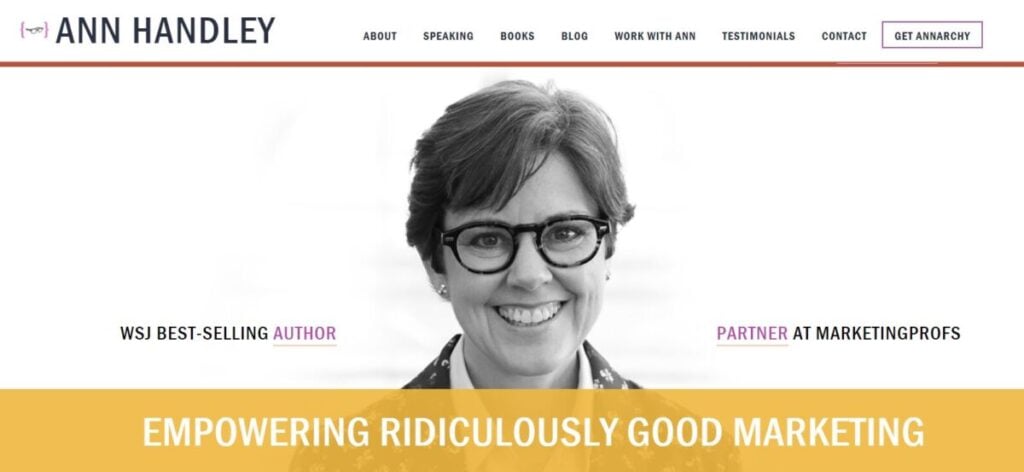
Ann Handley personal website
Personal Brand Statement:
Empowering ridiculously good marketing.
Ann Handley is a pioneer in digital marketing. She is also a writer and a speaker who helps other marketers scale up their marketing businesses to deliver exceptional results. Her simple tagline says that she empowers "ridiculously good marketing."
Why It Works
Ann's personal statement works because of how strong of a case it creates for her work. The use of "ridiculously good" shows that her work is not just good. She's setting the bar high, which is an excellent way to draw potential clients in.
This statement gives you an idea of just how good Ann is at her job. It also gives you a fair idea of how approachable and relatable she is because the tone is casual.
In a more descriptive explanation, Ann says that she inspires other marketers to "create marketing magic." This gives you the idea that she helps other marketers do something that they once thought was impossible.
9. Shama Hyder
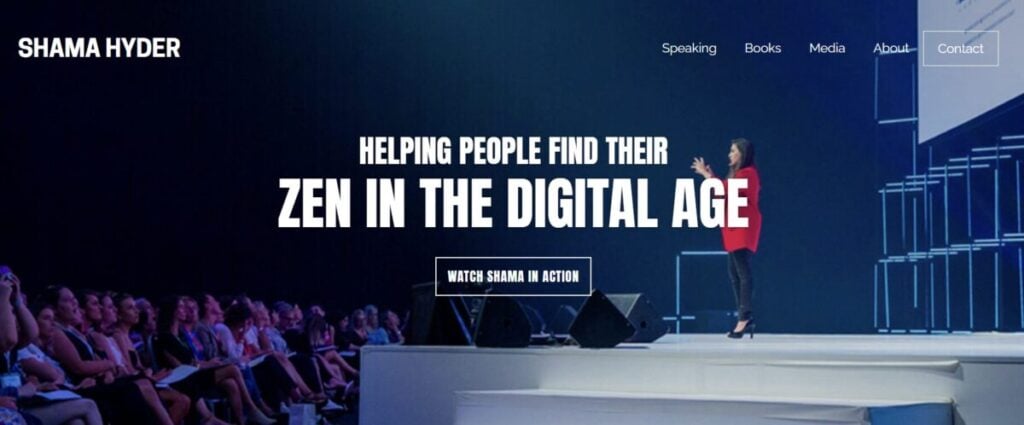
Shama Hyder personal website
Personal Brand Statement:
Helping people find their zen in the digital age.
Shama Hyder is a digital marketing expert and keynote speaker who helps people navigate the digital marketing world. She has also written several books, including The Zen of Social Media Marketing and Momentum: How to Propel Your Marketing and Transform Your Brand in the Digital Age. Her personal statement is sweet and short, but it speaks volumes about her work.
Why It Works
Shama's personal brand statement is effective due to its closeness to her brand. She uses "zen" quite strategically, playing on its double meaning: first, the idea of finding balance and second, using it to hint at her global marketing and digital PR firm, Zen Media. Entrepreneur Magazine has also named her the "Zen Master of Marketing," so her use of the term "zen" aligns well with her already established personal brand.
Another reason why this statement works is that Shama positions herself as someone who can help businesses find that balance in the midst of all the chaos of the digital age. The absence of mentioning how she does so leaves room for curiosity and encourages potential clients to reach out and learn more about her services.
Why Is a Personal Brand Statement Important?
Your personal brand statement serves several purposes. For starters, it helps you stand out from the crowd. It's a representation of your skills, personal values, accomplishments, experiences, and characteristics that make you unique. You can use this statement to search for jobs or network with industry professionals.
Moreover, a personal brand statement allows you to tell people who you are instead of letting them assume your identity. It gives you control over how others perceive you. Carl Jung, the famous Swiss psychologist, explains this quite well by saying,
"The world will ask who you are, and if you do not know, the world will tell you."
Your personal statement helps you take charge of your brand and shape it in the way you want others to see it.
When creating an online brand or portfolio for yourself and your services, a personal brand statement also helps bolster credibility. According to a paper published by Sergey Gorbatov, a PhD candidate at Vrije Universiteit Amsterdam, personal branding sits
"at the junction of marketing, sociology, communication, psychology, organizational behavior, and some would claim even accounting."
So, it's not just a statement but a psychological, sociological, and marketing tool to help you succeed in your personal and professional life.
What Are the Elements of a Strong Personal Brand Statement?
A strong personal brand statement has the following elements.
- Conciseness: You want it to be memorable and easy to recite, so aim for about 1-2 sentences maximum.
- Authenticity: Your personal statement should come from a genuine place and not be generic or fabricated.
- Clarity: Keep your personal brand statement simple. Avoid using jargon or complex language.
- Relevancy: Your personal brand statement should be relevant to your current goals and aspirations. It should also align with the industry or field you are targeting.
- Achievements/Accomplishments: Include your most significant and relevant achievements to exhibit your skills.
- Personal Brand Personality: Your personal brand statement should reflect your personality and values. Let your uniqueness shine through.
Let's look at how all of these elements are present in an effective statement, such as Debbie Levitt's. Here's her personal brand statement:
I'm The Mary Poppins of CX/UX. I fly in, find the true problems, improve everything I can, make the magic happen, sing a few songs, and fly away to the next project… or I can stick around! I'm dedicated to transforming companies, departments, teams, projects, products, services, and experiences by focusing on the full arc of the Customer Experience.
The first sentence instantly establishes Debbie's personality. She stays authentic, clear, and relevant by explaining what she can do for a company. Her statement is also concise and easy to remember. She shows her accomplishment by explaining that she can transform the "full arc of the customer experience."
How to Craft Your Own Personal Brand Statement?
Jason Hartman, entrepreneur, speaker, and author, provides a comprehensive approach to creating your personal brand statement. He says,
"There are three main factors to consider in the process of creating your brand: 1) Connection with your niche, 2) A shared worldview with your audience, and 3) That you be trusted as a source of information."
Here's how to put these factors into practice.
Step 1: Identify Your Unique Value Proposition
What is it that you offer that sets you apart from others? What skills, achievements, experiences, and qualities make you stand out? This is your unique value proposition.
Michael Hyatt explains this well,
"Your brand is what sets you apart from others. It's what makes you unique and memorable."
So, focus on what you do best.
Step 2: Define Your Target Audience
Your personal brand statement should be targeted towards a specific audience. Identify who your ideal customers/clients are and what you can offer them.
For example, Jennifer Welsh's main audience is women. So, as we mentioned earlier, her statement specifically mentions helping women. Similarly, Nomadic Matt addresses travelers, and Ann Handley talks to marketers.
Step 3: Express Your Core Message
Gary Vaynerchuk, CEO of VaynerMedia, explains how to really make your brand shine,
"The best strategy for building a personal brand is to be 100% 'you,' without watering down your personality in any way."
That's what you need to do in your personal brand statement.
Use action words to show what you do. For example, Shama Hyder's personal statement,
"Helping people find their zen in the digital age,"
uses "helping" and "find"—both are action words that show her core message of providing guidance in the digital world. Do the same in your statement by showing the impact you aim to make.
Step 4: Keep It Short
We've discussed this earlier. Your personal brand statement should be brief and must focus on the key highlights of your unique value proposition.
Keep it to one or two sentences, and make every word count. You don't want your audience to lose interest halfway through reading or listening to it. Also, use active voice to make your statement more engaging.
Step 5: Revise
Go over your personal brand statement multiple times and make revisions as necessary. If it helps, get feedback from others who know you well and can provide honest opinions.
Your personal brand statement is not set in stone. It can evolve and change as your brand grows and develops. For example, you may start as a social media marketing tips expert and later expand to become a digital content creator. Your personal brand statement should reflect this growth and progress over time.
We have a detailed guide discussing personal branding tips where you can learn more.
Best Practices for Writing a Personal Brand Statement
Here are some quick tips to make your personal brand statement worth remembering.
Tailor the Message to Your Audience
Your brand won't be for everyone, and that's fine. Speak specifically to your audience so that they know you mean business. As Laura Busche, author of Lean Branding, explains,
"People relate to people, and if your brand feels like people, they'll relate to you, too."
Be Authentic
In the same vein, make authenticity the central theme of your brand. Don't cosplay to be somebody you're not. Today's audiences can smell fake from a mile away, and they will quickly turn off if they don't trust your messaging.
Dan Schawbel, author of Promote Yourself, emphasizes this by saying,
"The only brand you can sustain is the one that is authentic to you."
Authenticity will also help you stand out in a crowded market, as no one can replicate your unique combination of experiences and personality.
Show Where You're Heading
According to Jack Trout, an advertising executive,
"No one will follow you if you don't know where you are going."
We agree.
Saying "I'm an XYZ expert" isn't enough. You have to show what you're working towards and where you want to go. For example, in his personal brand statement, Chris Do, CEO of The Futur, says,
"I've run an Emmy award-winning motion design/brand consultancy for over 23 years. Now, I teach the world how to value themselves and communicate their value to others through open platforms like YouTube, Facebook and Twitter."
He doesn't merely state his past accomplishments but also his current goals and direction, i.e. teaching others how to communicate their value. That gives his audience a reason to heed his message and follow him.
Time to Build Yourself a Brand
As we've repeatedly mentioned throughout this guide, your personal brand statement is concise, impactful, relevant, and authentic. Follow the tips we've mentioned to create a statement that best reflects your personal brand. If you need inspiration, the examples in this guide can serve as good models to guide you.
Most importantly, a personal brand statement is not something you write once and forget about. As you grow, it changes. The Harvard Business Review recommends an annual audit of your personal statement.
Jill Avery, a senior lecturer at the university, suggests:
"In addition to doing an objective self-assessment, you'll want to reengage your truth-tellers to uncover what your current image is in the minds of others and then make sure that it aligns with your goals."
Keep this in mind to keep your personal brand statement relevant and effective. Check out our branding guide for more information.
Frequently Asked Questions
What are some examples of personal brand statements?
Your personal brand statement has to be strong, descriptive, short, and catchy all at the same time. Some examples include:
- “I help individuals reassess their life choices to discover their true paths to success.”
- “I develop sustainable business models and marketing strategies to fuel small business growth.”
How do you write a personal brand statement?
Creating the perfect and most effective personal brand statement can be tricky. Your personal brand statement is basically a catchphrase that says something about your expertise and what makes you unique. People reading the statement should know exactly what you can do and what you specialise in. You need to carefully choose the right words and arrange them the right way to get your message across effectively.
How do you write a personal statement for your resume?
Writing a personal statement for your resume is an important way to showcase yourself. Just like brands and businesses have a statement that says something about themselves and their values, you need a strong statement of who you are and what you can do. People reading the statement should know exactly what you can do and what you specialise in.
What is a well-written personal brand statement?
Your personal brand statement should be concise and reflect your abilities. Some examples of well-written personal brand statements include:
- “Empowering ridiculously good marketing.
- “Content marketing evangelist.”
- “Half geek – half marketing – 100% social nut!”
- “I grow companies.”
How can you write a great personal impact statement on your resume?
Steps to a great personal impact statement for your resume include:
- List all important actions you took
- Determine action words for yourself
- Tailor your personal statement to the job you apply for
- Focus your statement around skills and measurable actions


